No Results Found
The page you requested could not be found. Try refining your search, or use the navigation above to locate the post.
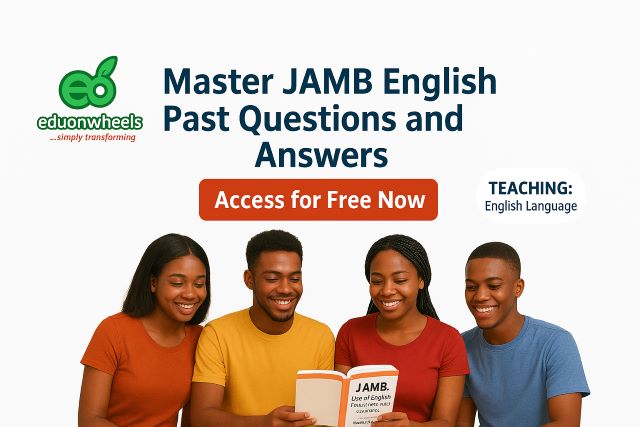
The page you requested could not be found. Try refining your search, or use the navigation above to locate the post.
Are you preparing for the JAMB UTME and looking for reliable study materials to boost your English Language performance? Eduonwheels’ JAMB UTME English Language (Use of English) Past Questions and Answers Free 2013 is your perfect resource.
This comprehensive collection provides the exact JAMB UTME English Language (Use of English) Past Questions and Answers Free 2013, helping you understand the exam pattern, question types, and key focus areas. Whether you’re revising for comprehension, lexis and structure, or oral forms, these past questions will guide your preparation and increase your confidence for the upcoming JAMB exam.
JAMB UTME Use of English exam? Eduonwheels provides comprehensive resources for English Language teaching and learning, specifically designed for JAMB students preparing for their exams. Get started with our free 2014 past questions! Images: 1
Questions: Numbered 1 – 100
COMPREHENSION
PASSAGE I
Political change and social transformation in the form of revolutions have radically altered the course of human civilization and history. Today, the world is witnessing political and social changes arising from the desire of people all over the globe for greater freedom and a voice in the way they are governed and a better standard of living. Part of these struggles and processes have become more pronounced in the Third World since the end of the East-West cold War in the late 1980’s, and in the face of the challenges being posed by the ongoing process of globalization.
While political and social changes may appear to be distinct phenomena, they are analytically inseparable. Political and social changes refer to alteration or transformations in human behavior, norms and politico-social institutions. Such changes are often a collective response to the need to change, or as a tacit recognition of a shift in the prevalent power relations in the society. Therefore, the coming to power of a new set of rulers, or the establishment of new structure and processes of governance broadly typifies socio-political changes.
It is important to note that changes can either be positive or negative. In most cases, political and social changes are caused by certain factors or reasons. This push people to collectively organize themselves to struggle for a change in the existing power relations. Another reason is to capture political power in the hope of making life better for the generality of the people. If politics is defined as who gets what, when and how; it then implies that political change refers to an alteration in the form of power and the identity of the group or class which controls the wields states power.
Questions: 1 – 5:
1. Which question paper type of use of English is given to you?
A. type F
B. type E
C. type L
D. type S
2. Which of the following is true according to the passage?
A. Change is inevitable
B. Change is inimitable
C. Change is inestimable
D. Change is invaluable
3. It can be deduced from the passage that political and social changes are
A. repulsive
B. intertwined
C. antithetical
D. independent
4. A suitable title for this passage is
A. Social Change and Political Empowerment
B. Reasons for Political Change
C. The Struggle for Political Power
D. Elements of Politics
5. The word (alteration), as used in the passage, means
A. complication
B. multiplication
C. recognition
D. modification
PASSAGE II
Like all reptiles, snakes are cold blooded, or more correctly, ectothermic – they cannot produce their own body heat; instead, they rely on the sun to heat their bodies. Because they do not rely on energy from food to generate body heat, snakes can survive on an extremely meager diet. Some wait for months between successive meals, and a few survive by eating a large meal just once or twice a year. When they do eat, snakes swallow their prey whole rather than biting off small piece. Many snakes have specialized jaws that enable them to swallow animals that are far larger than their own heads. Although uncommon, some snakes, such as the African rock python, have been observed eating animals as large as an antelope or a small cow.
With over two thousand five hundred species belonging to more than ten families, snakes are a large and successful group. They owe much of this success to their versatility – snakes occupy habitat ranging from underground burrows to the top of the tree, to ocean depths as great as one hundred and fifty meters. They are found on every continent except Antarctica, and although they are most abundant in tropical areas, many survive in regions marked by extreme cold. The only places without snakes are parts of the polar regions and isolated islands, such as the Republic of Ireland and New Zealand as opposed to places in Nigeria like Plateau and Gombe States in the Northern part where there is a large population of snakes.
Questions: 6 – 10:
6. It can be inferred from the passage that snakes are
A. homogeneous reptiles
B. heterogeneous creatures
C. voracious cow eaters
D. great insect eaters
7. The most notable thing about snakes, according to the passage, is that they
A. exist in families
B. abound in Gombe and Plateau States
C. are versatile in reproduction
D. eat big but seldom
8. Which of the following is true according to the passage?
A. Snakes are seldom seen at the Antarctica
B. Snakes are not in the polar regions
C. Snakes are endemic on every continent
D. There are countless number of snakes in the Republic of Ireland
9. It can be deduced from the passage that snakes have
A. large appetite for antelopes
B. no external auditory organ
C. visible internal locomotive organs
D. no visual sense of measurement
10. A suitable title for this passage is
A. Species of Snakes in Nigeria and Other Lands
B. Feeding Habits of Snakes
C. Some Characteristics of Snakes
D. Snakes as Legless, Cold-blooded Reptiles
CLOZE
PASSAGE III
Choose the most appropriate option for each gap.
Setting up a newspaper involves a lot of preparations. The 11 has to employ a lot of people. Other people working with him are cartographers, editors, typesetters, readers, who work in various ways to produce the text of the newspaper, 12, who go out and collect story and items of news, and 13, who specialize in one kind of topic. Another important person who works closely with the Editor-in-Chief is the 14, who has to choose the most important stories. 15 go through stories sent to them and make necessary adjustments.
The Editor-in-Chief could determine for instance, whether a particular journalist should write articles daily or weekly in a particular column. Such a journalist is known as 16. The editorials of the newspaper will be coordinated by 17. The publisher could decide to establish 18 which would be on sale weekly, fortnightly, or monthly, 19 the eye catching, screaming headlines and captions of newspapers on sale everyday from the 20.
11.
A. sub-editor
B. processor
C. lithographer
D. proprietor
12.
A. vendors
B. agents
C. reporters
D. analysts
13.
A. newscasters
B. correspondents
C. distributors
D. listeners
14.
A. reporter
B. announcer
C. news editor
D. proof reader
15.
A. producers
B. sub-editors
C. writers
D. agents
16.
A. an essayist
B. a freelancer
C. composer
D. columnist
17.
A. an agent
B. a guild of researchers
C. an editorial board
D. all readers
18.
A. a gazetteer
B. an article
C. a column
D. a magazine
19.
A. a contrast in
B. a contrast from
C. a contrast for
D. a contrast to
20.
A. salesmen
B. readers
C. distributors
D. pressmen
LITERATURE – NOVEL READING
Questions 21 to 30 are based on Chukwuemeka Ike’s “The Potter’s Wheel”.
21. Chief Okeke Okafo decided to buy an ‘iron horse’ because it would
A. raise his status in the clan
B. minimize the strain of travel from one town to another
C. give him the opportunity to act like the District Commissioner
D. allow him to be the head of the clan
22. “… the vanquished dragon, spewing sand instead of fire gave a solemn and humiliating pledge that he would never cross Obu’s path.” From the excerpt above, the word (vanquished) means
A. unconcerned
B. sensitive
C. subdued
D. unflappable
23. In the novel, the suspicion that Obu was an ‘Ogbanje’ had revealed the
A. disappearance of Obu in Standard I
B. price tag Mazi Laza and his wife placed on Obu
C. participation of Obu as a member of the masquerade group
D. time Obu spent at Teacher’s house
24. According to the novel a pupil who cared his class would be instructed to
A. fetch firewood for the teachers
B. carry a pad
C. clean the latrines
D. dance on the assembly ground
25. “If you get confused at any stage, let me know! I want this pottage to be well prepared.” The statement above was meant to
A. encourage Ada’s cooking habit
B. confuse Obu
C. test Obu’s cooking skills
D. distract Ada
26. According to the novel, Mazi Laza would shout at any person standing in his way because his bicycle
A. was manufactured by local engineers
B. had faulty brakes and outdated pedals
C. came from the same stock as Chief Okeke’s
D. had injured people on many occasions
27. From the novel, the first person to own a bicycle in Umuatulu clan was
A. Polycarp’s father
B. Mazi Lazarus
C. Teacher Zacheaus Kanu
D. Chief Okeke Okafo
28. In the novel, what did Mazi Laza do after putting a pinch of snuff into each nostril?
A. He gave the remaining to Nwobiara
B. He nodded with satisfaction
C. He complained of the stuff
D. He commended his wife
29. From the novel, what was Ada’s punishment for fighting with Madam?
A. She fetched water from the stream with a basket
B. She ate only once a day for one week
C. She scrubbed the school latrine for one week
D. She copied Psalm 119 from start to finish
30. In the novel, Obu would not touch cocoyam soup because he claimed it
A. would get stuck in his throat
B. would make him sick
C. was not well prepared
D. had lost its taste
Questions 31 to 35 are based on Jerry Agada’s “The Successors”.
31. The entertainment expenses for Okoh Amen’s traditional marriage rites were paid for by
A. the bride’s parents
B. Okoh Amen
C. Terkura Atsen
D. Okoh Amen’s parents
32. Mla’s friend asserted that Bob Marley and other reggae stars were ‘good’ because they
A. were gainfully employed
B. listened to their parents
C. went to school
D. smoked Indian hemp
33. From the novel, what did Terkura do with balance of the money Chief Olega paid him?
A. He brought a beautiful house
B. He invested it in his business
C. He bought two cars for his father
D. He married another wife
34. Makurdi became more prominent because of the
A. bridge
B. international hotel
C. railway station
D. road
35. In the novel, Maria’s tolerance of her husband spending half the night on duty at the hotel was considered a
A. way to remedy all marital problems
B. necessary price to pay for the success of their marriage
C. bad thing that couple should discourage
D. way of taking a great risk
SENTENCE INTERPRETATION
Select the option that best explains the information conveyed in the sentence.
36. The minister considered the ministry’s budget to be a drop in the ocean in view of the number of projects in the pipeline.
A. The pipeline project across the ocean will be abandoned unless budgetary allocation improves
B. The amount available may be inadequate for projected expenditure
C. The minister may be dropped for failing to complete a number of projects
D. The money approved cannot complete the pipeline project across the ocean
37. The police are looking for the woman who farmed her children out to her neighbours.
A. The police wanted the woman for allowing her children to destroy her neighbour’s crops
B. The woman and her children are in the habit of working in neighbour’s farms and the police are not well disposed to this
C. The police may arrest the woman for allowing her neighbours to take care of her children
D. The woman may be arrested for allowing her children to be a nuisance to her neighbours
38. Jummai’s father remarked that pigs would fly before she passed.
A. She would have to cheat in order to pass
B. It would be possible to pass only if she worked harder
C. It would never be possible for her to pass
D. He would have to bribe her teachers to enable her to pass
39. The president said that he found himself between a rock and a hard place when the press said that he has resigned.
A. Hard places are dangerous for the president
B. He dreamt that he was abandoned
C. He thought that hard places were unsafe
D. He had a hard decision to make
40. Kunana is like a bear with a sore head.
A. He is a bully
B. He is grumpy
C. He is ugly
D. He is quiet
41. Olu gave his brother a bumpy ride.
A. Olu’s brother rode on Olu’s back to success
B. Olu took his brother on a bumpy road
C. Olu gave his brother a difficult time
D. Olu gave his brother a ride on his car
42. Adeola doesn’t have to go to the farm today.
A. Adeola may go to the farm today if he so wishes
B. Adeola ought not to have gone to the farm today
C. Adeola must not go to the farm today
D. Adeola should not go to the farm today
43. My boss asked me to take my eyes off the ball.
A. I should stop paying attention to what is most important
B. I should be focused when I am about to stay off football
C. I should stay off football after sustaining an injury
D. I should be focused when playing football
44. The robber was hedged in by the people.
A. The robber was surrounded by the people
B. The robber was killed by the people
C. The robber was exposed by the people
D. The robber was caught by the people
45. Many workers are not happy because they live a hand-to-mouth life.
A. They work hard with their hands
B. They are voracious and avaricious
C. They are barely surviving
D. They have rejected the use of spoons
ANTONYMS (OPPOSITE IN MEANING)
Choose the option opposite in meaning to the word or phrase (in brackets and italics).
46. Prolonged strike action (debilitated) the industry.
A. strayed
B. invigorated
C. isolated
D. weakened
47. One of the students bought a (plagiarized) copy of the book.
A. an annotated
B. a used
C. an original
D. a revised
48. The young girl was (taken aback) by her father’s gift of a car.
A. nonplussed
B. shocked
C. unmoved
D. surprised
49. Musa is a gifted but (erratic) player.
A. unstable
B. strong
C. regular
D. unpredictable
50. The lamp shades were (translucent).
A. transparent
B. opaque
C. intersected
D. luminous
51. My niece has an (unquenchable) thirst for adventure stories.
A. an inextinguishable
B. a spurious
C. an illegitimate
D. a reduced
52. Some of my neighbours have an (antipathy) to dogs.
A. alarm for
B. enmity towards
C. affection for
D. acronym for
53. The dressmaker (unpicked) the seam of the shirt.
A. tore up
B. threaded
C. sewed up
D. picked up
54. The testimony of the witness was (vague).
A. clear
B. disturbing
C. true
D. ambiguous
55. As a student, Isa tried (communal) living for a few years.
A. private
B. collective
C. general
D. shared
SYNONYMS (NEAREST IN MEANING)
Choose the option nearest in meaning to the word or phrase (in brackets and italics).
56. The chairman admires (incessant) meetings.
A. irregular
B. unusual
C. planned
D. constant
57. Today’s weather is (favorable) for a game of tennis.
A. disapproving
B. impartial
C. abnormal
D. encouraging
58. All the candidates looked (aghast) at the reading of the questions.
A. relaxed
B. fulfilled
C. dismayed
D. satisfied
59. Joke gave Muhammad a (jaunty) smile.
A. a cheerful
B. a discouraging
C. an inviting
D. a frightful
60. The first round of the tournament was a (doddle).
A. exasperating
B. easy
C. balanced
D. dodgy
61. The lazy man cast a (lustful) glance at his neighbour’s wife.
A. envious
B. hateful
C. quick
D. covetous
62. They accused him of (fomenting) political unrest.
A. guiding
B. inciting
C. discouraging
D. preventing
63. You can (learn) a great deal just from watching other players.
A. discover
B. invent
C. accumulate
D. allow
64. All the researchers were asked to (gather) information on the new viral infection.
A. give
B. collect
C. disseminate
D. distort
65. The dispute between the two countries has resulted in the (severing) of diplomatic relations.
A. strengthening
B. breaking
C. securing
D. swapping
SENTENCE COMPLETION
Choose the option that best completes the gap.
66. The house and the senate will __________ at noon next Wednesday, to hear a special address by the president.
A. collude
B. convene
C. adjourn
D. rise
67. At the __________ of the century, many ways of doing things were introduced.
A. sight
B. turn
C. event
D. birth
68. You may have the pencil, but you can’t have the ballpoint __________.
A. as well
B. either
C. furthermore
D. also
69. The president said that the country was not out of the __________ yet.
A. wood
B. forest
C. fog
D. water
70. He went to the restaurant to enjoy the special __________.
A. chef
B. suite
C. cuisine
D. a la carte
71. The invigilator __________ to know how long the examination __________ going on.
A. wanted/ had been
B. wanted/ has been
C. want/ had been
D. wanted/ have been
72. The guard spent all the night pacing __________.
A. to and fro
B. from and to
C. fro and to
D. to and from
73. The woman refused to testify __________ her husband.
A. from
B. in
C. at
D. against
74. A biker must have found the very interesting movies quite __________.
A. perverting
B. absolving
C. absorbing
D. nauseating
75. The words __________ divided between the end of one line.
A. has being
B. have been
C. have being
D. has been
76. Those __________ are very beautiful.
A. flowers of ours
B. flowers of her
C. flowers of her’s
D. our flowers
77. Cooking has never been Jumoke’s __________.
A. forte
B. recital
C. conduct
D. style
78. When the strike is over, there will probably be an increase in wages and a __________ increase in prices.
A. chronic
B. sporadic
C. concordant
D. concurrent
79. My mother was __________ annoyed with me for coming late.
A. just
B. very
C. neither
D. hotly
80. The chairman is too much __________ an idealist for coming late.
A. with
B. from
C. about
D. of
81. The clock __________ 12 o’clock two hours ago.
A. striking
B. strikes
C. strike
D. struck
82. What is the jury’s __________ the matter?
A. verdict with
B. verdict on
C. verdict at
D. verdict from
83. The unconscious man was __________ after receiving first aid.
A. revived
B. reawakened
C. reformed
D. restored
84. The laughter __________ his face for a moment.
A. remade
B. improved
C. controlled
D. animated
85. She traced her family history __________ matrilineal.
A. at
B. in
C. by
D. with
PHONETICS – VOWEL SOUND
Choose the option that has the same vowel sound as the one represented by the letter (in brackets and italics).
86. c(oo)l
A. should
B. full
C. Luke
D. look
87. (o)dour
A. floor
B. flow
C. sugar
D. hold
88. p(a)lm
A. plait
B. ranch
C. florid
D. launch
PHONETICS – CONSONANT SOUND
Choose the option that has the same consonant sound as the one represented by the letter (in brackets and italics).
89. vi(s)ion
A. enclosure
B. instruction
C. mansion
D. nation
90. (gn)ash
A. ring
B. forge
C. new
D. king
91. epita(ph)
A. pneumonia
B. pseudo
C. fan
D. paper
WORD RHYME
Choose the option that rhymes with the given word.
92. ever
A. heavier
B. favour
C. fever
D. never
93. keep
A. dead
B. reap
C. seethe
D. threat
94. tax
A. ask
B. box
C. lacks
D. back
STRESS PATTERN
Choose the most appropriate stress pattern from the options.
95. valedictory
A. vaLEdictory
B. valeDICtory
C. valedicTORY
D. VALedictory
96. congratulation
A. conGRAtulation
B. congraTUlation
C. congratuLAtion
D. CONgratulation
97. conspiracy
A. CONspiracy
B. conspiRAcy
C. conspiraCY
D. conSPIracy
EMPHATIC STRESS
The word in capital letter has the emphatic stress. Choose the option in which the given sentence relates.
98. My mother bought a BICYCLE yesterday.
A. When did my mother buy a bicycle?
B. What did my mother buy yesterday?
C. Whose mother bought a bicycle yesterday?
D. Did my mother steal a bicycle yesterday?
99. AMINA went to Abuja by air.
A. Did Amina go to Jos by air?
B. Is Amina going to Abuja by air?
C. Who went to Abuja by air?
D. Did Amina go to Abuja by road?
100. Musa is STAYING in Enugu.
A. Was Musa staying in Enugu?
B. Is Musa going through Enugu?
C. Is Musa staying on the outskirt of Enugu?
D. Is Audu staying in Enugu?
Get free access to JAMB English Past Questions and Answers and boost your exam preparation with Eduonwheels! Images: 2
Answers: Numbered 1 – 100
You will find in our other Use of English Past Questions and Answers:
JAMB UTME English Language (Use of English) Past Questions and Answers: Repeated Questions 2001 – 2025
JAMB UTME English Language (Use of English) Past Questions and Answers: Topics, including New Topics
JAMB UTME English Language (Use of English) Past Questions and Answers PDF 2001 – 2025
JAMB UTME English Language (Use of English) Past Questions and Answers: Likely Questions 2026 – 2030
Preparatory Tests on JAMB UTME English Language (Use of English) Past Questions and Answers: MCQ
Get your JAMB UTME English Language (Use of English) Past Questions and Answers Free 2014! Join thousands of students using Eduonwheels to master Comprehension, Lexis & Structure, Antonyms & Synonyms, and Phonetics for exam success. Images: 3
Answer Explanations: Numbered 1 – 100
1. C – This is a document-specific question. Based on the options provided, the answer is type L.
2. A – The passage discusses changes happening globally, which implies that change is inevitable (unavoidable or certain to happen).
3. B – The passage explicitly states that “political and social changes may appear to be distinct phenomena, they are analytically inseparable,” meaning they are intertwined (closely connected).
4. A – The passage focuses on both social change and political empowerment, making this the most comprehensive title.
5. D – “Alteration” means a change or modification in something.
6. B – With over 2,500 species in more than 10 families, snakes are heterogeneous (diverse or varied) creatures.
7. D – The passage emphasizes that snakes can swallow large prey but can survive for months between meals, meaning they eat big but seldom.
8. B – The passage states “The only places without snakes are parts of the polar regions,” confirming they are not in the polar regions.
9. B – This can be deduced from the passage’s description of snakes’ physical characteristics. Snakes have no external auditory organ (no external ears).
10. C – The passage discusses various characteristics of snakes including their feeding, habitat, and distribution.
11. D – The proprietor (owner) would be the one to employ people for the newspaper.
12. C – Reporters go out and collect stories and items of news.
13. B – Correspondents specialize in one kind of topic or report from specific locations.
14. C – The news editor chooses the most important stories.
15. B – Sub-editors go through stories and make necessary adjustments.
16. D – A journalist who writes regularly in a particular column is a columnist.
17. C – An editorial board coordinates editorials.
18. D – A magazine is published weekly, fortnightly, or monthly.
19. D – “A contrast to” is the correct preposition to use when comparing differences.
20. C – Distributors handle the sale and distribution of newspapers.
21. B – The bicycle (iron horse) would minimize the strain of travel between towns.
22. C – “Vanquished” means defeated or subdued.
23. A – The suspicion revealed Obu’s disappearance in Standard I.
24. B – A pupil who came last in class would carry a pad as punishment.
25. C – The statement was meant to test Obu’s cooking skills.
26. B – Mazi Laza’s bicycle had faulty brakes and outdated pedals.
27. D – Chief Okeke Okafo was the first to own a bicycle in Umuatulu clan.
28. B – Mazi Laza nodded with satisfaction after taking snuff.
29. D – Ada had to copy Psalm 119 from start to finish as punishment.
30. A – Obu believed cocoyam soup would get stuck in his throat.
31. D – Okoh Amen’s parents paid for the traditional marriage rites.
32. D – The friend claimed they were good because they smoked Indian hemp.
33. B – Terkura invested the balance in his business.
34. A – Makurdi became more prominent because of the bridge.
35. B – Maria’s tolerance was considered a necessary price to pay for the success of their marriage.
36. B – “A drop in the ocean” means insufficient or inadequate compared to what is needed.
37. C – “Farmed out” means to send children to be cared for by others.
38. C – “Pigs would fly” is an idiom meaning something will never happen.
39. D – “Between a rock and a hard place” means facing a difficult decision with no good options.
40. B – “Like a bear with a sore head” means grumpy or bad-tempered.
41. C – “A bumpy ride” figuratively means giving someone a difficult time.
42. A – “Doesn’t have to” means it’s optional, so Adeola may go if he wishes.
43. A – “Take eyes off the ball” means to stop paying attention to what’s most important.
44. A – “Hedged in” means surrounded or trapped.
45. C – “Hand-to-mouth life” means barely surviving with just enough to meet basic needs.
46. B – “Debilitated” means weakened; the opposite is “invigorated” (strengthened).
47. C – “Plagiarized” means copied; the opposite is “original.”
48. C – “Taken aback” means surprised or shocked; the opposite is “unmoved.”
49. C – “Erratic” means unpredictable or irregular; the opposite is “regular.”
50. B – “Translucent” means allowing light to pass through partially; the opposite is “opaque” (not allowing light through).
51. D – “Unquenchable” means insatiable or unable to be satisfied; the opposite is “reduced.”
52. C – “Antipathy” means strong dislike; the opposite is “affection for.”
53. C – “Unpicked” means to undo stitching; the opposite is “sewed up.”
54. A – “Vague” means unclear or ambiguous; the opposite is “clear.”
55. A – “Communal” means shared or collective; the opposite is “private.”
56. D – “Incessant” means constant or continuous.
57. D – “Favorable” means encouraging or advantageous.
58. C – “Aghast” means dismayed or horrified.
59. A – “Jaunty” means cheerful and lively.
60. B – “Doddle” means something easy or simple.
61. D – “Lustful” means covetous or having strong desire.
62. B – “Fomenting” means inciting or stirring up.
63. A – “Learn” means to discover or acquire knowledge.
64. B – “Gather” means to collect or assemble.
65. B – “Severing” means breaking or cutting off.
66. B – “Convene” means to come together for a meeting.
67. B – “Turn of the century” is the correct phrase.
68. B – “Either” is correct in negative sentences to mean “also not.”
69. A – “Out of the woods” means out of danger or difficulty.
70. C – “Cuisine” refers to a style of cooking or food.
71. A – Past tense “wanted” and past perfect “had been” are correct.
72. A – “To and fro” is the correct idiom meaning back and forth.
73. D – “Testify against” is the correct preposition.
74. C – “Absorbing” means engaging or fascinating, fitting the context of interesting movies.
75. B – “Have been” is the correct present perfect tense for plural subject “words.”
76. D – “Our flowers” is the correct possessive form without redundancy.
77. A – “Forte” means a person’s strong suit or area of expertise.
78. D – “Concurrent” means happening at the same time, which makes sense for wages and prices increasing together.
79. B – “Very” is the correct adverb to modify “annoyed.”
80. D – “Too much of” is the correct phrase structure.
81. D – “Struck” is the past tense of “strike” for clocks.
82. B – “Verdict on” is the correct preposition to use with “verdict.”
83. A – “Revived” means brought back to consciousness.
84. D – “Animated” means brought to life or made lively.
85. C – “By matrilineal” is correct, indicating the method of tracing.
86. C – “Luke” has the same /uː/ vowel sound as “cool.”
87. B – “Flow” has the same /əʊ/ vowel sound as “odour.”
88. C – “Florid” has the same /ɒ/ vowel sound as “palm.”
89. A – “Enclosure” has the same /ʒ/ consonant sound as “vision” (the ‘s’ in vision sounds like /ʒ/).
90. C – “New” has the same /n/ consonant sound as “gnash” (the ‘gn’ in gnash sounds like /n/).
91. C – “Fan” has the same /f/ consonant sound as “epitaph” (the ‘ph’ sounds like /f/).
92. D – “Never” rhymes with “ever” (both end with -ever sound).
93. B – “Reap” rhymes with “keep” (both have the long ‘ee’ sound).
94. C – “Lacks” rhymes with “tax” (both end with -acks/-ax sound).
95. B – The stress in “valedictory” falls on the third syllable: vale-DIC-tory.
96. C – The stress in “congratulation” falls on the fourth syllable: congra-tu-LA-tion.
97. D – The stress in “conspiracy” falls on the second syllable: con-SPI-ra-cy.
98. B – When “BICYCLE” is stressed, the question asks “What did my mother buy yesterday?”
99. C – When “AMINA” is stressed, the question asks “Who went to Abuja by air?”
100. D – When “STAYING” is stressed, it contrasts with someone else staying, so the question asks “Is Audu staying in Enugu?” (contrasting Musa with Audu).
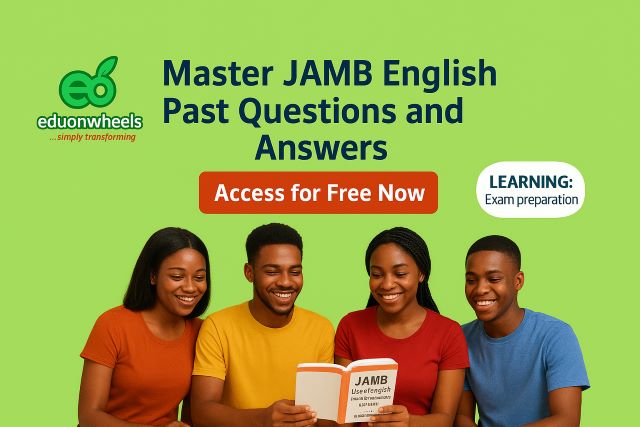
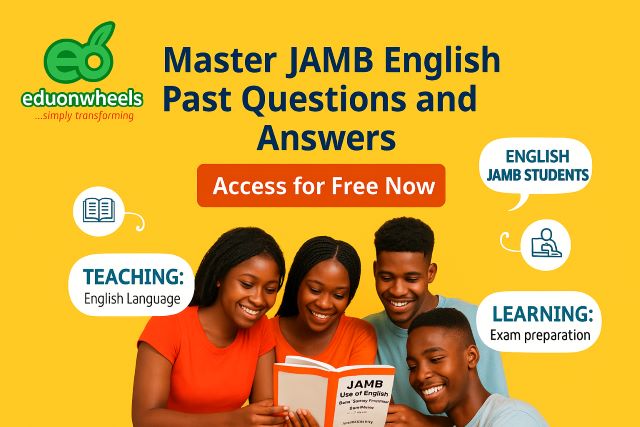
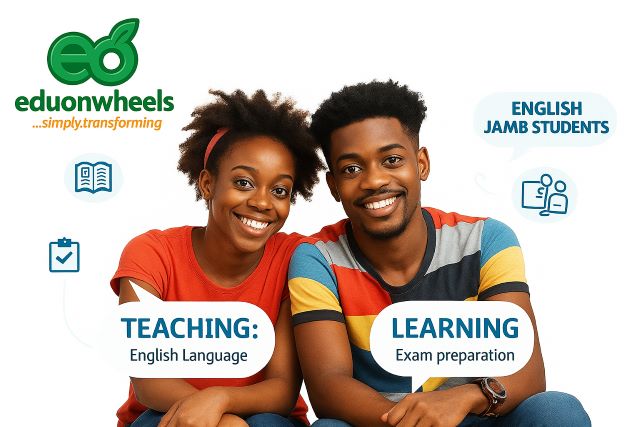




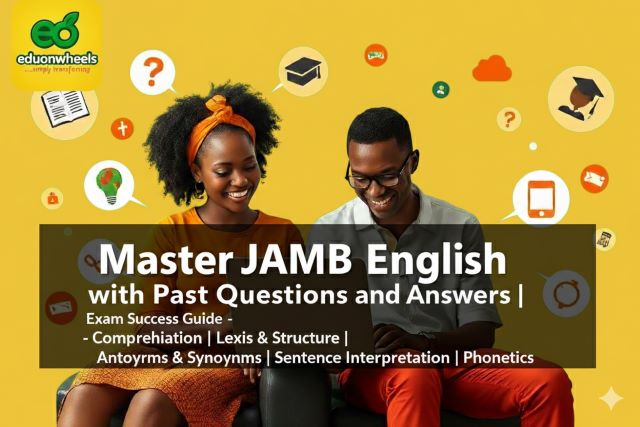
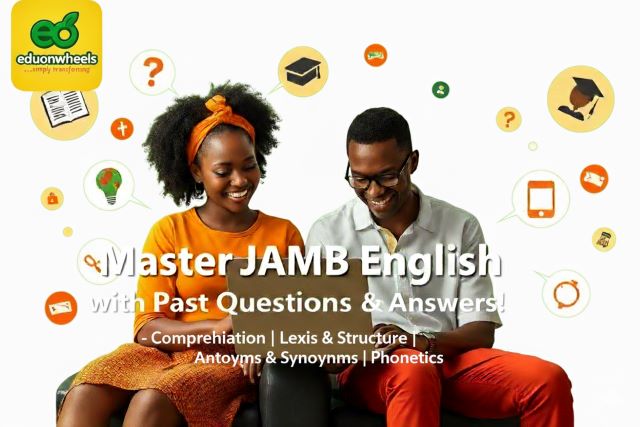
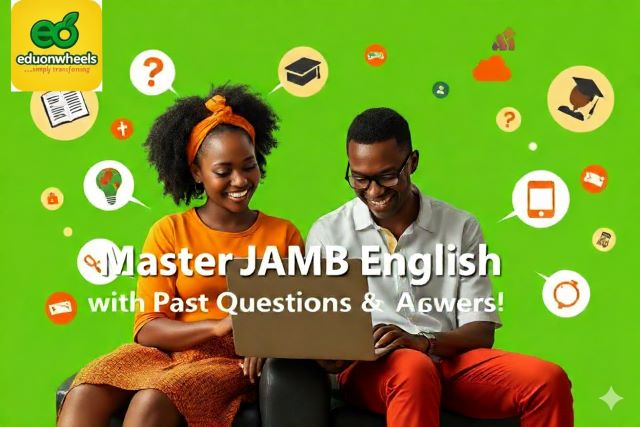
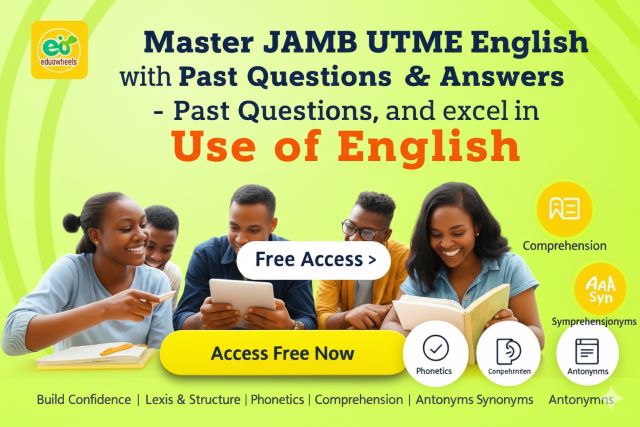

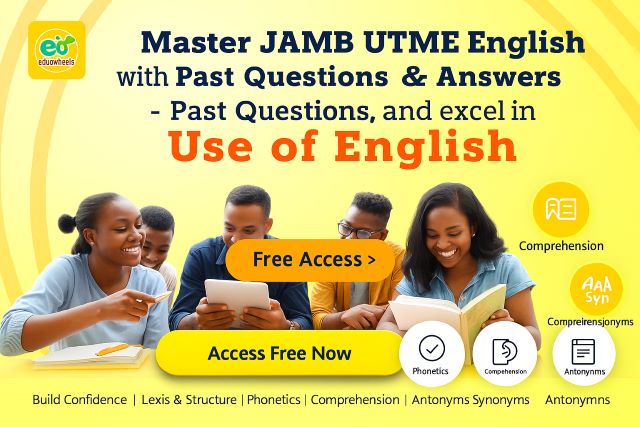
0 Comments